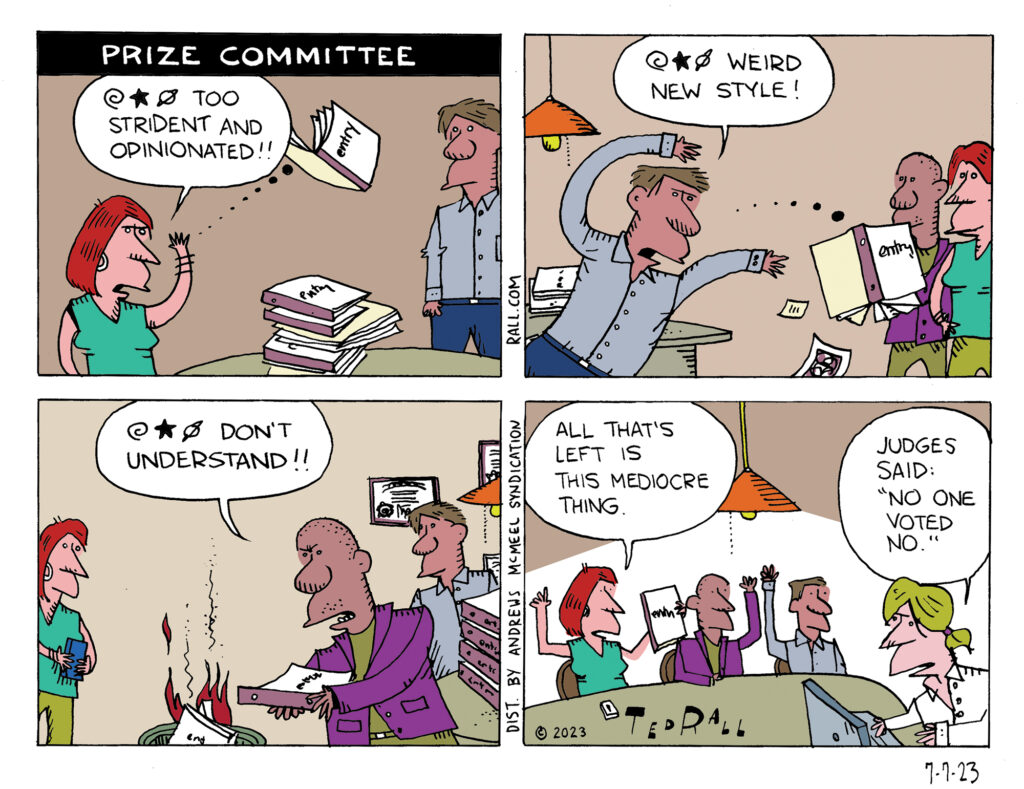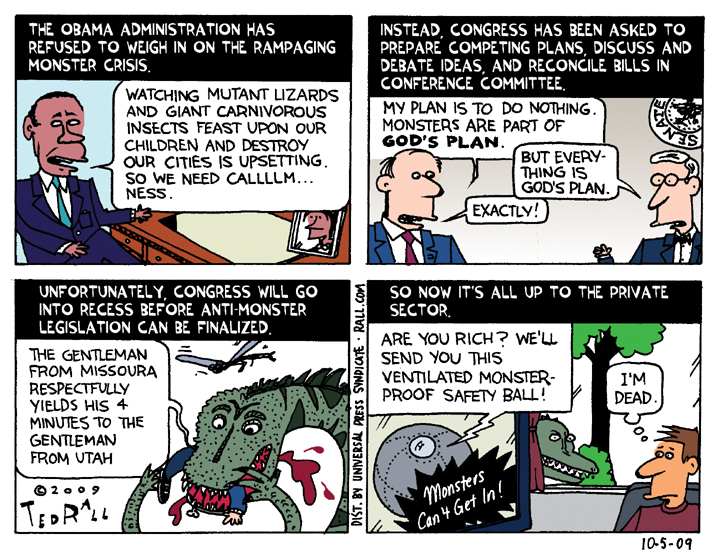Malcolm Gladwell extolled the wisdom of the crowd, but it should also be noted that assessing quality is not a job that a committee of people is capable of pulling off very well. Work that is controversial, ahead of its time, different or unique falls by the wayside. In the end, winners tend to simply be the person or entry to which no one said no.
What Are Awards For?
 What are awards for? More precisely, what should they be for?
What are awards for? More precisely, what should they be for?
John McWhorter recently argued in The New York Times in favor of a retroactive Pulitzer Prize for Duke Ellington, who was snubbed for the journalism and arts award in 1965. My encyclopedic ignorance about jazz entitles me to have no opinion whatsoever about this attempt at raising an issue.
One sentence in McWhorter’s essay, however, deserves special attention: “We assume that Pulitzers are awarded to work that qualifies as for the ages, that pushes the envelope, that suggests not just cleverness but genius.”
Do we really assume that?
Should we?
When the Pulitzer board or governing body of other major prizes like the Oscars, Emmys, Tonys and so on decides upon the recipient of an award, what message is it trying to send?
I agree with McWhorter. An award for best whatever of the year should first and foremost go to the best work in that category. A close-second consideration — my opinion, obviously — should favor work that is transformative, original, different. Judging by lists of previous prize winners, however, some people disagree…particularly those who decide the winners of these contests.
While the media obsesses over awards and prizes handed out to its fellow elites, such competitions are part of life across every social strata, from elementary-school best-citizen awards to 4-H contests to merit badges to best employee of the month at a fast-food joint to your boss’ annual review. They determine whether or not you get a raise, sometimes whether you keep your job or get laid off, and even whether people are shocked or just shrug their shoulders after you kill yourself. Awards and prizes are key components of human motivation under capitalism, of which angling for higher relative social status is a primary driver, perhaps the top one.
Like most of my fellow scribblers, I have spent too much of my time and energy handicapping — always unsuccessfully — award decisions for two simple reasons. First, winning one can really help your career. When I started out newspapers were reluctant to pick up my cartoons, which were drawn in a brutalist style at odds with the prevailing, crosshatched norm and ideologically far to the left of my colleagues. The establishment imprimatur of the 1995 RFK Journalism Award made enough editors feel safe to run my work that I was able to quit my day job. Second, we look to award announcements for indications of the kind of work that the powers that be are looking for from us. Conservative cartoonists, passed over in favor of liberals year after year, not unreasonably believe their work is neither valued nor wanted.
As a judge on several award committees (not the Pulitzers) I have participated in numerous discussions about what criteria should be applied to assess the worthiness of prize applicants. I have also raptly absorbed countless secondhand accounts of the proceedings inside the hallowed halls of the Journalism Building at Columbia University, where the Pulitzers are administered.
(Earlier this year, Columbia eliminated the Pulitzer for editorial cartooning, merging it with a category so broad that the possibility that a political cartoonist could win has been reduced so radically that there’s no longer a point to entering.)
My experiences as a judge convinced me that the all-too-human members of prize committees are incapable of rendering anything approximating a reasonable decision. Very few judges have the comprehensive knowledge of the field they are judging necessary to do the job. Almost none have any historical background that informs the relevance of what they are looking at. Most elevate superficial factors — it made me laugh, the art is pretty — over more serious concerns like: does it make you think? Does it make you think differently? Does it take the form in a new, exciting, better direction? Does this award encourage smarter work, or — as is too often the case — discourage it?
Seymour Topping, late administrator of the Pulitzer Prizes, vetoed my elevation from finalist to winner on the grounds that “[Rall] doesn’t draw like the other editorial cartoonists.” The same year, one of the RFK judges told me I won because my drawing style was different. Both decisions were dumb.
So what are awards for? Mainly, they’re for reinforcing the status quo. For example, the common practice of having previous winners of a contest judge it ensures stylistic continuity.
Awards are a stupid idea poorly executed. People win prizes to make up for having been passed up in earlier years even though other, younger creators are now better than them. Corruption is rampant. Committees don’t bother to look at some entries. Committee members direct other members to vote for their friends and drinking buddies. Sometimes there is horse-trading in order to evenly distribute prizes to winners affiliated with different employers. Even worse than corruption is the utter lack of qualifications of those making the decisions; among the decisionmakers for the cartoon Pulitzer have been a freelance technology writer and editors for newspapers that don’t run any cartoons.
Although I have won awards and still apply — you have to play the game — I would abolish them. Unlike sports like track and basketball, where the metrics are straightforward — you either cross the finish line first or the ball goes through the hoop, or not — journalism and the arts are subjective. I may disagree with the Motion Picture Academy’s choice of the now-forgotten “Ed Wood” over Tarantino’s Gen X masterpiece Pulp Fiction” and giving a Grammy to Milli Vanilli over fellow nominees Tone Lōc and the Indigo Girls. But it’s a fair bet that the voters who made those calls assess film and music, and who should win awards for it, via different metrics than I do. Even if it were possible to objectively determine what is “best,” elevating one person at the expense of an entire field is toxic and discouraging.
But contests aren’t going anywhere. So we should try to agree on what it means when someone or something is declared the best of its kind.
(Ted Rall (Twitter: @tedrall), the political cartoonist, columnist and graphic novelist, co-hosts the left-vs-right DMZ America podcast with fellow cartoonist Scott Stantis. You can support Ted’s hard-hitting political cartoons and columns and see his work first by sponsoring his work on Patreon.)



